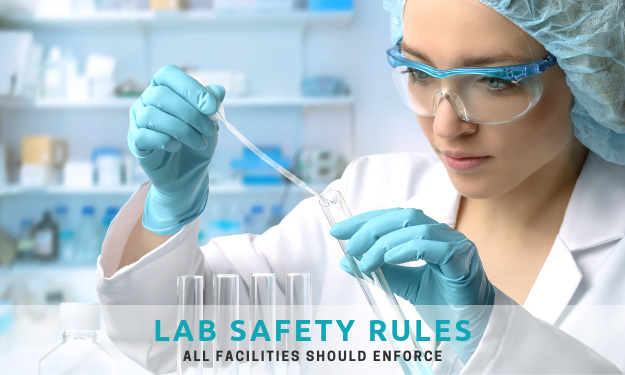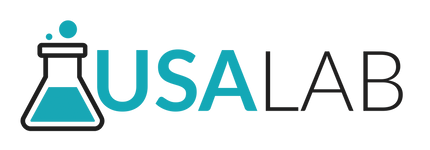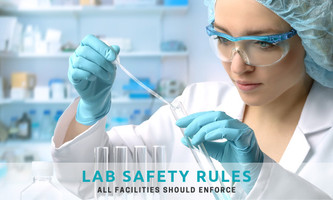Lab Safety Rules All Facilities Should Enforce
Sep 4th 2019

Due to chemicals, gases, and flammable substances, laboratories can be dangerous places—especially when no one enforces safety precautions. Regardless of what type of lab you are working in, the potential for chemical spills, gas leaks, and fires is always present. To keep all patrons safe while working in a lab environment, these are some essential lab safety rules that everyone should follow.
Wear the proper attire
In the case of an accident, such as a chemical spill, your clothing is your first line of defense against dangerous exposure. If you don’t sport the proper attire, your skin could come into contact with harmful substances which may leave lasting harm. To prevent this from happening, all lab personnel should wear long sleeves, covered shoes, and long pants to protect their skin—regardless of the type of lab they are working in. If you have long hair, you should always tie it back to reduce the chance that it falls into a chemical or open flame. In certain cases, you may also need to wear additional protective gear such as safety goggles, gloves, and a lab coat.
Have a clear exit route
Since laboratories often deal with dangerous chemicals and flammable substances, there is a greater risk for a fire outbreak or gas leak. In each case, it is essential to quickly depart from the vicinity to ensure patrons’ safety. As such, it is especially important for all lab personnel to be aware of exit routes from the lab. All laboratories should have at least two clear exit routes in case one gets blocked. Such exits should be clearly marked and easily accessed. All patrons should regularly practice proper evacuation procedures to ensure a swift and safe exit in the case of a real emergency.
Take your time
Rushing or running in a lab is extremely dangerous, especially when holding chemicals or equipment. Regardless of the situation, patrons should refrain from running. Doing so may lead someone to accidentally trip and break equipment. An individual may also spill hazardous liquids on themselves or others.
Never bring food or drink into a lab
Laboratories are often full of dangerous chemicals that are poisonous to ingest. By bringing food or drink into the lab, you risk contaminating it. Touching food with a hand that still has chemical residue on it or setting it on an unclean surface are frequent causes of food contamination. While it may seem obvious to avoid such behavior, regularly eating in a lab can cause you to let your guard down. Eventually, you may make a detrimental and careless mistake. Eating and drinking in the lab may also take your focus off your work and cause you to make a dangerous error. In addition to the health risks, bringing food and drink into a lab could lead to spillage which could contaminate your experiment and skew the results.
Identify the location of all safety equipment
All labs should have the appropriate safety equipment. This equipment will likely include fire extinguishers, safety showers, eyewash stations, first aid kits, and fire blankets. In the case of an emergency, such as chemical exposure or a fire, seconds could be the difference in minor and severe damage. As such, everyone in the lab should know exactly where each piece of safety equipment is so that they can get to it as quickly as possible.
Know how to use safety equipment
Safety equipment is useless unless lab patrons know how to handle it. During an emergency, there is no time to waste fiddling with the equipment or reading instructions. You will need to be able to use it immediately. As such, provide all lab patrons with thorough training on how to properly use all the equipment.
Regularly check safety equipment
If a chemical spill happens and someone needs to rinse off in the safety shower, you don’t want to uncover an issue with the plumbing. After initially installing safety equipment, you shouldn’t that everything will all work flawlessly. Regular maintenance checks will help avoid such situations by ensuring that all equipment works and that you have fully stocked safety kits.
Follow supervisor instructions
Lab personnel should never work alone and should always be working under the direct supervision of a lab supervisor. While working in a lab, personnel should only perform experiments that the supervisor authorized and should follow all written and verbal instructions. Deviating from instructions can put everyone in danger. If a question arises about the process, always consult with your supervisor before continuing.
Immediately report any issues
If an accident occurs in a lab, never try to cover it up or fix it without notifying your supervisor. If there is any damaged equipment, spilled chemicals, or gas leaks, it is important for everyone in the lab to know immediately. If not, exposure to dangerous toxins or pathogens may occur without anyone knowing. As such, no one will be able to take the necessary action to manage its effect. Further, personnel may waste time trying to identify the issue’s source which will exacerbate the danger of the situation.
Do not leave active experiments unattended
If an experiment is active or overheat, you should never leave it unattended. Experiments can be dangerous, and small issues can quickly escalate if not immediately attended to. As such, all active experience must have someone supervising so they can deal with potential issues immediately.
Properly dispose of lab waste
After completing an experiment or procedure, you must properly dispose of the remaining waste. Before disposing of the equipment, segregate it to prevent any dangerous chemicals from mixing. If equipment requires a special disposal process, make sure to follow it completely to ensure safe clearance.
USA Lab Equipment has been providing quality products to labs across the country since 2010. To help you find what you need, we stock a wide array of over 1,000 new and used lab equipment items—from distillation kits to glassware to drying ovens. To learn more about our products and exceptional service, contact us today.

